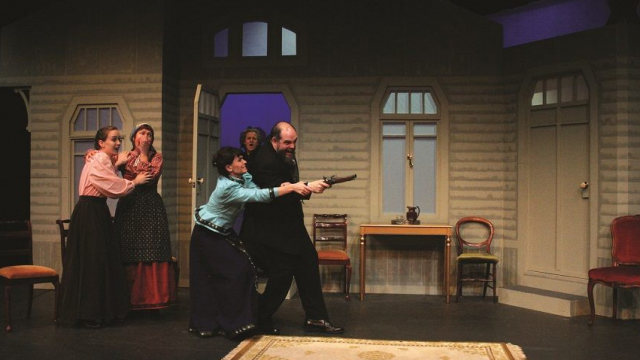Uncle Vanya
In vino veritas: in wine is truth. One of the most beautiful, truthful moments in Rep’s production comes when Voynitzky (the Uncle Vanya of the title), drunk on vodka, drops his emotional shield of sarcasm and flippant humour, and speaks softly, from the heart, of his love for Yelena. His bravado vanishes and his cadence changes in a way that is natural, familiar and unstereotyped. Less sensitive direction could have made had Vanya a regular loud drunk, stumbling and slurring words, but instead the vodka leaves him disarmed. Such deft handling of moments of recognition, wry laughter and regret define this nuanced production.
All the major characters are layered. Played by Sam Hannan-Morrow, Voynitzky is in constant struggle to control his emotions, only to have them burst through at times of vulnerability. One of the tools he uses to leaven the emptiness of his life is a particular dark humour, the sort of wry, self-effacing irony the pathologically melancholic use to get through life. Even the famous would-be gun scene is played partially as farce. Another well-developed character is Lanie Hart’s Yelena, whose façade of prototypical cold, hard beauty, cracks open to show warmth and empathy to her stepdaughter (played with sensitivity by Yanina Clifton). Jim Adamik, who Canberrans will know to be a fine comic actor, possibly has less range in his role here than the other players but nonetheless is both hilarious and arresting as the depressed doctor Astrov.

Writing this review is a bit daunting. As the former head of ANU Drama, Geoffrey Borny not only is one of the most lauded directors in Canberra, he wrote the book on Chekhov after 15 years of studying his works. Borny knows and has an infectious passion for his subject. My knowledge of Chekhov has been confined to the Chekhov’s gun rule and my first thought after my perfunctory glance over the Spark Notes synopsis was, "heck, this is grim," and indeed many previous productions have been stodgy Russian angst. I couldn’t have been more wrong. Borny’s touch is feather-light and David Mamet’s adaptation is free of turgid 1890s Russian text.
It’s almost eerie how the themes explored by Chekhov in Uncle Vanya are so relevant today. Astrov’s maps of declining tree cover over the years predict current weather maps showing rising temperatures. Interclass relationships in pre-revolution Russia are strikingly familiar. The emotions, burdens and passions of these characters are timeless.
Canberrans, you have a chance to see Chekhov treated in a way that brings out his brilliance, with a director who likely knows more about Chekhov than virtually anyone else in the country. See it while you can.
Cathy Bannister
Subscribe to our E-Newsletter, buy our latest print edition or find a Performing Arts book at Book Nook.

